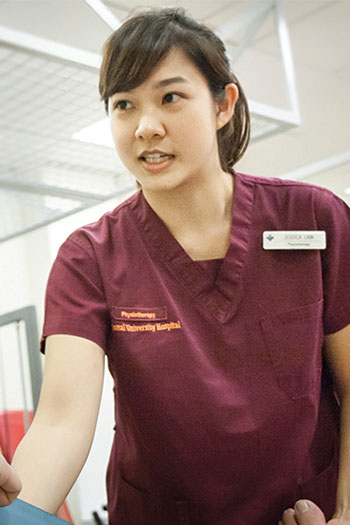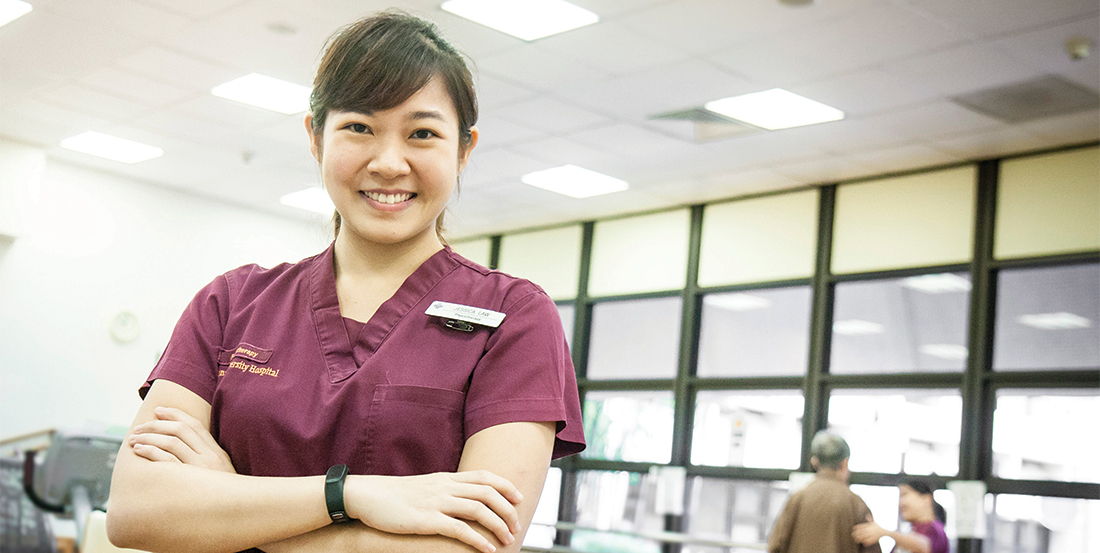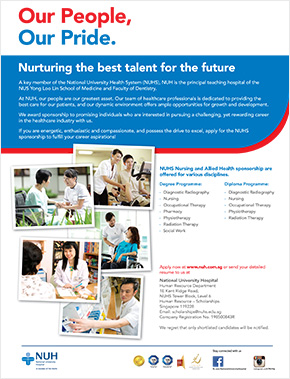From injured athletes to illness-stricken individuals and the elderly, physiotherapists assess and treat a variety of patients with human movement limitations. Physiotherapists work with these patients to help alleviate their pain, as well as improve their muscle strength and mobility through a range of therapeutic exercises and techniques. Discover more about the world of physiotherapy from Healthcare Scholar Jessica Law Heng Jun.
What sparked your interest in physiotherapy?
Jessica Law Heng Jun: While I was in junior college, I had the opportunity to observe different healthcare professionals through several hospital attachments. I remember being the most inspired by physiotherapists during these stints. Their skills and passion in helping patients through rehabilitation fuelled my decision to join this profession!
Share with us more about your current role.
Jessica: As a physiotherapist in the NUH Rehabilitation Centre, I assess and treat physical difficulties in a bid to restore movement and function in my patients.
In an acute hospital like NUH, a member of the NUHS, my main concern is ensuring that patients will be safe at home after they are discharged. During a hospital admission, patients can become weak very quickly from prolonged bedrest. I work with patients to prevent this decline, and aim to improve their functional mobility as much as possible. This enables them to return to their daily activities more easily. I also play a role in educating patients to engage in a healthy lifestyle and train their caregivers in helping them safely at home.
What are some misconceptions surrounding physiotherapy?
Jessica: Many patients assume that I am there to give them massages! In actual fact, patients are the ones doing most of the work during our sessions. Some patients also expect to recover fully after one or two sessions. However, recovery is usually a process that requires a lot of time and patience.
Describe the challenges you face at work and how you have overcome them.
Jessica: One challenge I face is trying to change the misconception that being sick or hospitalised means that patients have to rest in bed all day. To tackle this, I try my best to educate my patients on the benefits of therapy. But when all else fails, I have to try to be creative! I once tried to convince a patient to walk by telling her that she could walk her Pokémon.
Another challenge I face is trying to maximise a patient's function while keeping in mind their clinical problems. I need to be sure that the therapy I render is effective yet safe at the same time. This is what makes my job interesting because every patient is unique!
Tell us about an incident that had left an impact on you.
Jessica: I was once asked to help a cancer patient who had been bedbound for weeks to sit in a chair, as it was one of his final wishes to have a reunion dinner with his family. We had to train his domestic helper to make sure she could assist him at home. In the end, he was even able to walk a few steps with a cane! As a physiotherapist, it was a very heart-warming and validating experience to have helped him fulfil his wish.

Jessica Law Heng Jun
Healthcare Scholar
Physiotherapist,
NUH Rehabilitation Centre
Name some qualities vital to your profession.
Jessica: I think patience and sensitivity are very important for anyone who is working in the healthcare industry. I believe that having the patience to listen and communicate is crucial in every session in order to build good rapport with your patients. As a physiotherapist, it is also important to know when you have to be firm or sensitive enough to engage patients in therapy.
What opportunities have you received as a Healthcare scholar?
Jessica: MOHH frequently sent representatives to touch base with us through engagement dinners and even helped to arrange my internship at NUH. After returning to Singapore from my overseas studies, MOHH also organised a re-entry workshop to help us better integrate into the local healthcare sector and network with other healthcare professionals. These opportunities enabled me to stay in touch with Singapore's healthcare landscape during and after my undergraduate education.
In your opinion, why were you conferred the Healthcare scholarship?
Jessica: I hope it was because of the sincerity I showcased through my scholarship essays and interviews. I also had the opportunity to undertake leadership roles in my class and co-curricular activities; as well as during a service learning trip while in junior college. I think that being able to include these in my portfolio helped my application to stand out.
What would you like to say to students who are pondering their next step?
Jessica: I would advise them to apply for attachments and speak to people working in their fields of interests. This would allow them to gain a better understanding of their prospective career and what it entails. I would also like to encourage everyone to pursue what they are truly interested in! Allow your passion and career to meet.

